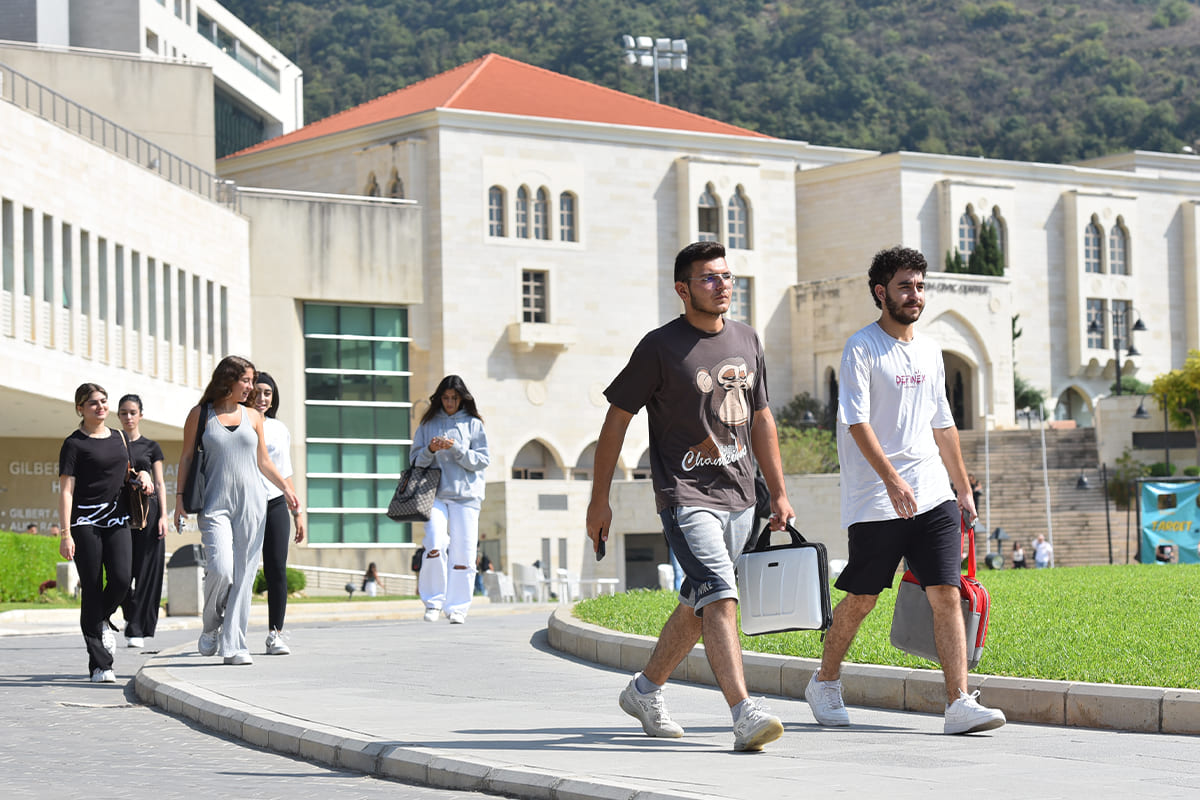A Students’ Guide for Maintaining Mental Health During Uncertainty
LAU Clinical Psychologists Rudy Abi Habib and Tony Sawma answer students’ pressing questions on striking a balance in their day-to-day life.
In light of distressing events, LAU clinical psychologists took the initiative to organize four sessions that addressed timely common concerns that faculty, staff and students across the LAU community are facing, and dedicated two in-person sessions for LAU students to learn directly from the experts.
Across the sessions, the clinical psychologists underscored that there is no “right” or “wrong” when facing emotional stress amid uncertainty. Typically, people initially react with a “fight, flight or freeze” response, which is not unhealthy initially, but which could lead to burnout if left unchecked.
In this interview, Associate Professor Rudy Abi Habib and Assistant Professor of Practice Toni Sawma, who are both clinical psychologists, discuss common concerns raised by the students on mixed feelings, stress management and maintaining a balanced routine during uncertain times.
How do I deal with being torn between what is expected from me – typically from parents – and what I can do during this period?
Dr. Abi Habib: When we cannot do what we feel we must do, we are overcome with frustration. It feels like a force is pulling us in one direction while another is pulling us in another. The extent of the frustration depends on the level of tension these forces are exerting on us.
During these unprecedented times, these forces are tremendous. Catering to your needs and desires on the one hand, and to what you can actually realize due to external constraints on the other requires heightened awareness and a lot of patience. Try to accommodate both needs, as a healthy balance is the key to handling current stressors.
Dr. Sawma: It is normal to experience discrepancy between what you feel you should do and what your parents want you to do. The generation gap and the different life experiences could lead to different perceptions of the situation, but self-awareness and healthy communication will help you. Identify the hidden reasons behind your feelings, and the latent emotions that are dictating your parents’ desires.
Keep in your mind that your parents could have experienced difficult moments in the Lebanese war. Listen, empathize, communicate and try to understand their point of view. Write down all the arguments supporting your position and your parents’ opinion. Then, you can use classical tools for decision making such as formulating a Strengths, Weaknesses, Opportunities and Threats (SWOT) analysis. This could help you to gain better clarity on the situation.
Communicate your decision with your parents in an objective way, steering clear of negative emotions and maintain healthy communications that allow you to regularly reassess your decisions with them.
How do I manage my day-to-day studies and routine?
Dr. Abi Habib: As much as what is happening is traumatic and to a certain extent all-consuming you need to consciously step away from social media and stick to a routine. The more uncertainties we face, the stricter the routine should be to maintain a minimal sense of normality.
Healthy eating, regular sleep, physical exercise and hobbies are among the many factors that can help in this area. Avoid overstimulation to be able to disconnect. Maintaining a healthy routine does not mean that you do not care about what is happening around you. You cannot pour from an empty cup – you have to remain healthy to be able to help.
Dr. Sawma: Plan your activities beforehand. Social support plays an important role: try to study with your friends, avoid unhealthy discussions and compulsive scrolling of the social media. Limit your exposure to the news. For example, instead of push notifications, think of checking a website every 60 minutes. Remember that this situation will not last forever.
How can I help and be involved?
Dr. Abi Habib: Any practical way that falls in line with your ethics and beliefs is appropriate. If you are a social media activist, there might be ways to help there. If donations are being organized, you can donate or help in the organizational efforts. Above all, you can help by being a healthy, successful citizen because involvement can take different shapes and forms. Your success in your studies is a sign of resilience.
Dr. Sawma: Volunteering could be beneficial. You will find many organizations and institutions showing solidarity using different means. Keep in your mind that solidarity does not mean violence.
What are some practical tools for self-care and stress management during this period?
Dr. Abi Habib: First, surround yourself with friends and family and take intentional breaks from social media. Maintain a healthy lifestyle by eating well, getting enough sleep and following a regular physical-activity schedule. You should also try to express yourself and make your opinion heard in healthy ways. Try to identify anxiety triggers if you can, and if not, seek professional help. Finally, remember that what is happening can be hard to process, so be easy on yourself.
Dr. Sawma: Recognize uncertainty and accept it. Accept what you can’t control, control your routine, and show solidarity. Practice mindfulness, monitor your sugar and caffein intake and be kind to yourself. Always ask yourself: what can I learn out of this situation? How can it help me develop a mature perception of myself, others and life in general?
